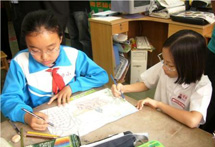Young Children’s Voices in Mathematical Problem Solving
Contributed by Dr Ho Siew Yin and Sng Wei Qin Abbie, from NTUC First Campus, for SingTeach Virtual […]
Read More
An overseas trip with their students leads teachers from Chongfu Primary to an important lesson about how to prepare children for a globalised world.
Learning can occur in situations where you least expect it. For Chongfu Primary teachers Mrs Wong Mei Lin and Mrs Chu-Tan Kim Yan, this can be the case for students and teachers alike.
In a school trip to Beijing, teachers were shocked to discover how students were unable to adapt to a new culture and environment. This led them to critically evaluate the school’s various programmes to prepare their students for future challenges.

In May 2006, Mei Lin and Kim Yan brought 40 Primary 5 students for a 1-week trip to Beijing, China, as part of the school’s Overseas Immersion Programme (OIP).
During the trip, students were hosted by Chinese families and attended classes along with their Chinese peers. The school’s main objective was to expose students to different cultures and experiences beyond Singapore.
“Besides academic development, character development is one of our school’s focuses,” says Kim Yan. “We are hoping to prepare our children for the globalised future so it’s important that they are able to face challenges in the globalised world.”
However, far away from their families in Singapore, the students were terribly homesick. They were unable to adjust to the long days at school and the language barrier was a bigger problem than the teachers anticipated. English lessons were too simple for the students, while other subjects were too difficult to comprehend in Mandarin. They were also not used to the food and some of the students fell ill because of the weather in Beijing.
“We always thought that the children would be very happy to have a chance to stay away from their families as this was what we felt at their age. We come from bigger families so it seemed fun to be able stay away from them,” says Kim Yan. “But for these children, most of them come from nuclear families and have very sheltered lives. So, having to stay in a new, foreign environment and alone, they experienced cultural shock.”
For the teachers, their students’ reactions on this trip were a real eye-opener. In particular, the students’ inability to cope in China revealed the gaps in their Character Development Programme (CDP), of which the OIP was a component of. This drove Mei Yin and Kim Yan to conduct an action research study adopting the Teachers Network’s Learning Circles Cycles method. Using observations, interviews with the students, and discussions with other parties involved in this trip, they prompted the school to review several areas of their curriculum. Not only did the CDP and pre-trip preparation need tweaking, but improvements were made to the Co-curricular Activities (CCAs) and Physical Education curriculum as well.
The original pre-trip preparation included a briefing on the classroom and home stay experiences, while emphasising to their students the importance of learning from their Chinese peers at the same time. After the 2006 Beijing trip, the teachers added photos from previous trips to the briefing. Participants from previous trips also had “sharing sessions” with other students who had gone on similar trips and blogs were set up so that students could update their parents while they were abroad.
Today, Chongfu Primary’s CDP include monthly talks on the school’s core values – responsibility and anger management. Dialogues on friendship and The Community Involvement Programme (CIP) has been expanded to include classroom and/or canteen cleaning sessions, which emphasise teamwork and food donation charity drives.
Additional CCAs like wushu, cadet scouts and recreational table tennis were developed so that students would be encouraged to develop self-discipline, learn to work in teams and interact in social situations.
The school begins to offer different camps for students from different levels under the Physical Education curriculum. These camps create opportunities for students to develop skills in leadership, independence and sportsmanship.
With all these new programmes in place, students on subsequent trips are able to cope better with their new environments. While the first Beijing trip was definitely stressful, both Mei Lin and Kim Yan are grateful for the experience.
“I think we have improved,” says Mei Lin. “I think that this sharing of experiences helped a lot in the sense that the learning curve is not so steep because we really learn from each other.”
To read Mei Lin’s and Kim Yan’s research paper, click here.